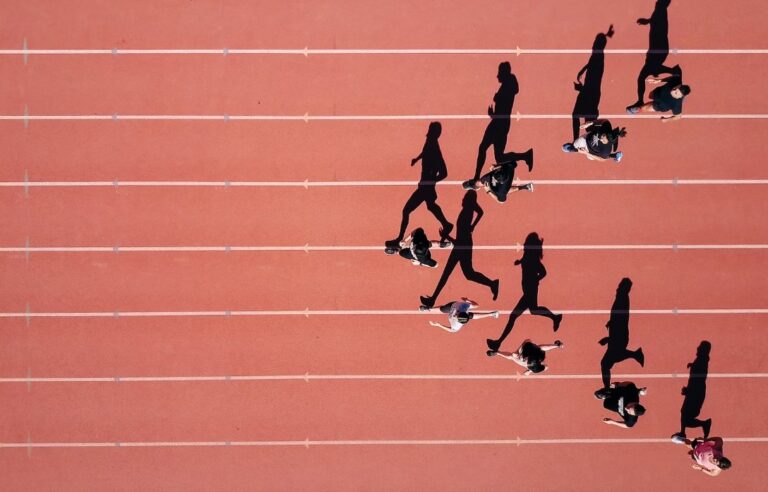Artificial intelligence is now invading every field, including education, business, entertainment, etc. We are yet to discover the full potential of artificial intelligence, so the progress is slow, but with time, we have come to know that AI can be a game-changer. The involvement of AI in the sport domain will bring revolutionary advancements. The big bosses of the sports industry are showing interest in AI in the sports domain. The data convey the same– according to the global sports analytics market, the valuation will spike to $22 billion by 2030.
The global sports market is a gigantic ocean of growth and development. The global sports market, which was $486.61 billion last year in 2022, has leapt to $512.14 billion in 2023.
Ai is still in its infancy stage but has already changed perspective and dimensions. Now, it will be interesting to see how the AI sports industry will make an impact.
Table of Contents
Application and benefits of AI in the sports domain
Artificial Intelligence can analyse and process a huge amount of data to help in decision-making. The sports industry is highly dependent upon analysis and planning. The possibilities are endless, as we can use this technology to meet various needs.
1. Players recruitment and selection
It is often a matter of debate when selectors pick players to do various sports events or tournaments. It is always hard for the selectors to pick the best player for their team or for the tournament.
After analysing players’ statistics and performance metrics, this task will be much easier.
2. Develop a game strategy
Pattern recognition is considered the best way to predict the close possibilities. AI is good at understanding patterns. AI can be a revolutionary tool that can help understand a game’s pattern through past records and identify key elements that always work.
Based on the found evidence, it can generate a strategy. This same power of AI can be used to self-analyse and identify the weaknesses of our own team or player.
3. Improve safety and injury prevention
AI can be used for diagnosis and suggest rest or prevention measures if they spot any risk. The medical team can do the same, but artificial intelligence can do it in a better way at a cheaper rate. One can view this as AI using sophisticated algorithms that can monitor players and regularly check players.
They can detect strain and imbalance and assist the medical team in preventing injuries. Instead of replacing a doctor, it can work together to make an efficient output.
4. Personalised training
Each athlete or sportsperson has specific requirements. It may be different from other athletes in terms of diet plan, physical requirements, mental health, strong zones, loose ends, etc. These areas can’t be addressed individually without a personalised trainer.
AI can fill the gap by addressing these perspectives and monitoring your progress. It can read you, train you, and advise you in each step.
Read more: When music meets artificial intelligence: 5 tools for musicians and composers
The challenges associated with AI in the sports industry
Artificial intelligence is incorporated into the sports industry to upgrade old methodologies. It will no doubt increase advancements, precision, and efficiency, but with new solutions, it will give rise to some new problems. Technology always has the threat of manipulation and hacking.
This one form of insecurity can be one of the biggest drawbacks of tech-enabled solutions. Let’s check the challenges associated with artificial intelligence in the sports industry.
1. Data privacy and security
Operating sensitive and personal information associated with players and athletes using AI will not be easy. The sports industry is huge, and this sensitive information is worth billions from the perspective of safety, security and the future. As artificial intelligence will be dealing with huge numbers of data, privacy will always be a question.
2. Bias and discrimination
AI is totally dependent on data, and if the historical data used to train AI contains bias, then it will inherit the same. AI, by nature, can learn things from experience, and we can’t control how it perceives things and ideas. An AI system needs regular testing and checks, as it may generate biases in algorithms if it perceives things in the wrong way.
3. Costs and accessibility
All kinds of sports organisations can’t adopt AI-based technology. It may not be pocket-friendly for all. The initial cost, starting from integrating to maintaining, will need a huge investment. However, it requires a dedicated professional, as AI is like a powerful genie who needs a master.
4. Job displacement
AI will automate tons of tasks for which organisations need to hire people. Relatively, it will engulf the job of people. When employment is already a problem, the introduction of AI is like fuel on the fire.
Future of AI in the sports industry
Mankind has yet to discover the full potential of artificial intelligence. We can say we have just learned the application of artificial intelligence. The applications are endless, but this sector also needs legislation to ensure the value of human resources.
The sports industry is not all about players and athletes, and it involves thousands of various roles, starting from the president of an organisation to a sweeper of the pavilion.
AI needs to be incorporated smartly into the development scope for human resources. The projected market size of artificial intelligence is 1811.8 billion by 2030, which is not a joke. It has the potential to unlock new jobs and sectors to deal with. Being in the sports industry, we can expect a lot of upgradation in artificial intelligence.
Read more: All about the Humane AI Pin, the first wearable AI technology












